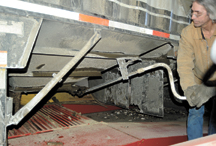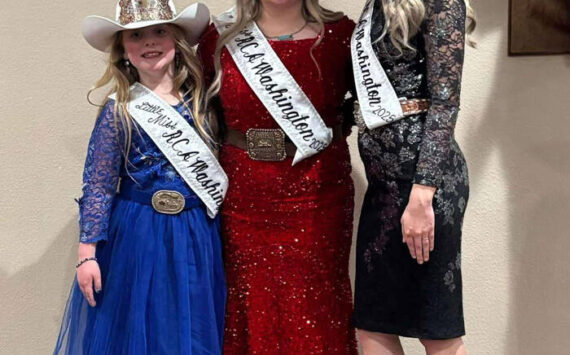
A truck driver from Lethbridge, Alberta opens the belly dump on the first of what’s hoped to be many truckloads of canola seed from the prairies of Canada for Carbon Cycle Crush in Oroville. The company has set up operation to crush the seed for oil and m
OROVILLE – Arnie Marchand updated the Oroville City Council about Carbon Cycle Crush’s canola seed milling operation located in the old Oro Fruit Warehouse.
“The project began about 18 months ago when Tim King and Ryan Skinner came here and gave a presentation. What they heard from you was ‘how can we help,'” said Marchand, adding the fledgling company got much the same response from the county commissioners and Roni Holder-Diefenbach, executive director of Economic Alliance.
While Marchand said other municipalities and counties were not accepting of the proposed milling and training operation, Oroville had several positive attributes Carbon Cycle Crush was looking for. These included a heavy-haul corridor from the Canadian Border to the active railhead in the middle of town.
“We expect about half our seed to come from Canada. Our first real truckload is on its way from there now,” Marchand said. “That will also be the first real test of our milling machines and allow us to do some tweaking to get them just right.”
The other half of the seed is expected to come from local farmers, who will share in the company’s profits, and from other farmers in Washington state. Canola is a used in many places as a rotation crop with wheat that often leads to much higher wheat yields, Marchand said.
Marchand, whose title at the company is Native American and First Nations Business Development Director, said the company also started working with the Colville Confederated Tribe 18 months ago. The Tribe has some test plots, but is still struggling, according to Marchand.
“We believe there’s 51,000 irrigable acres in the valley… conceivably we could get half our seed from here alone,” he said.
Marchand also talked about a dairy farmer in Douglas County who has been growing his own canola and crushing it to feed the meal to his cows for the past 20 years. Another farmer in the Palouse crushes canola he grows with a small crusher he invented, according to Marchand. That farmer feeds his cows with the mush-like product he gets and also makes his own biodiesel using the oil.
“From Spokane to the Palouse there’s tons of it,” he said. “Our plan is to stay the size we are and be a training facility as well as a crush facility. We are working on setting up similar operations wherever they’re needed and Oroville will be the training center.”
After a few questions from the council, Mayor Chuck Spieth thanked Marchand for the presentation, saying it was well done and easy to listen to. From there the council readdressed the question of another type of plant that can be grown locally – marijuana.
The council is still discussing what to do about the potential for collective medicinal marijuana gardens medicinal marijuana dispensaries. The city approved a moratorium on both at their previous meeting in February, however it is still researching what to do if someone approaches the city looking to locate a dispensary or to start a collective grow operation within the city limits. The biggest concern was for how this will affect the city when applying for federal grants because despite a state law that allows some marijuana production and use for medical purposes, it is still against federal law.
“(City attorney) Mick Howe has advised the City of Omak to flatly deny permitting and fight it in court if need be,” said Kathy Jones, city clerk.
Police Chief Clay Warnstaff said he hadn’t heard back from the City of Naches which has strong laws against cooperative grows and dispensaries.
“Actually the governor did veto parts of the law,” said Jones.
“Actually I think the governor vetoed the dispensary part,” said Chief Warnstaff. “The law already allows for individuals to grow for their own purposes… I just see a problem when you have collective gardens or dispensaries.”






